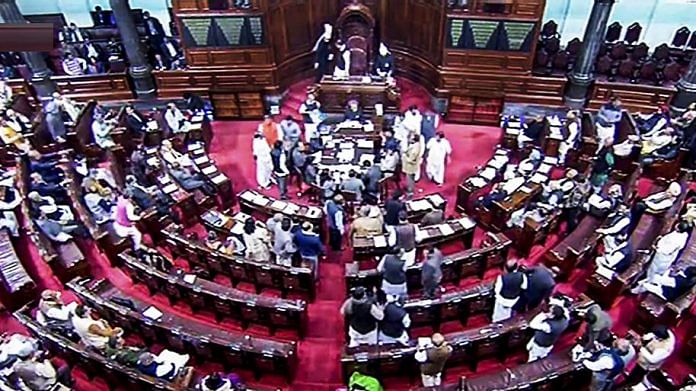The Modi govt, given a resounding mandate in the 2014 polls, sits comfortably in Lok Sabha but is still vulnerable in Rajya Sabha.
New Delhi: The Bharatiya Janata Party (BJP) managed to get the controversial bill that seeks to criminalise the practice of triple talaq passed in the Lok Sabha with little difficulty, but is struggling to do so in the Rajya Sabha, an oft-repeated story of its five-year term.
The BJP, which won with a resounding mandate in 2014, sits comfortably in the lower house of Parliament, but has been given sleepless nights by its numbers in the Rajya Sabha.
Take, for instance, the Muslim Women (Protection of Rights on Marriage) Bill, 2018, also known as the ‘Triple Talaq Bill’, which the Lok Sabha passed last week despite stiff resistance from the opposition. In the Rajya Sabha, however, the BJP does not have the numbers, with the party accounting for just 73 of the current 244 members of the house.
This is hardly new for the Narendra Modi-led government, which has constantly faced the great Rajya Sabha hurdle.
Perhaps its first reality check on its limited ability to legislate came in the form of the Right to Fair Compensation and Transparency in Land Acquisition, Rehabilitation and Resettlement (Amendment) Bill, 2015, through which the BJP government aimed to water down the existing act.
The Rajya Sabha hurdle
On 10 March 2015, less than a year after it assumed office, the BJP ensured the passage of the bill in the Lok Sabha but it hit the Rajya Sabha obstacle. Despite bringing in ordinances to effect the changes, the government was later forced to drop this bill altogether.
The Motor Vehicles (Amendment) Bill, 2016, which seeks to amend the existing Act to bring changes in aspects like third-party insurance, regulation of taxi aggregators, road safety, and traffic violations, was passed by the Lok Sabha on 10 April 2017. Opposed by various parties who allege it curtails the powers of the state government, the bill remains pending in the Rajya Sabha.
The Ancient Monuments and Archaeological Sites and Remains (Amendment) Bill, 2017, to amend the 1958 Act and allow public works projects within 100 metres of a protected monument, was passed by the Lok Sabha on 2 January 2018. The Rajya Sabha, however, wasn’t as convinced and referred the bill to a select committee, even though the government pushed for its early passage. The committee got an extension “up to last day of the first week of the next session, 2019”.
The Transgender Persons (Protection of Rights) Bill, 2016, was passed in the Lok Sabha on 17 December, but with opposition parties like the Congress and Trinamool Congress claiming that the legislation hurts instead of empowering the transgender community, it is expected to face stiff resistance in the Rajya Sabha.
Also read: Opposition wants select committee to take up triple talaq bill. Here’s what the panels do
The Aadhaar showdown
Perhaps the most contentious piece of legislation under this government has been the Aadhaar (Targeted Delivery of Financial and Other Subsidies, Benefits and Services) Bill, 2016, which gives legal backing and structure to the 12-digit biometric identity.
PM Modi has himself been deeply invested in Aadhaar, despite it being a UPA initiative, and the government wanted to do all it could to bring in the Act so as to pass legal scrutiny.
The BJP government pitched the legislation as a ‘money bill’, which can, by parliamentary rules, only be introduced in the Lok Sabha, with the Rajya Sabha allowed nothing more than to suggest amendments.
While the government may have succeeded in getting the bill passed, questions over why it chose the money bill route kept emerging, further highlighting the Modi government’s vulnerability in the Rajya Sabha.
Also read: Today’s Parliament debate on triple talaq was just ‘politics and posturing’




To ask a simple peasant’s question : Why is a TTT Act needed at all ? The apex court has held the practice unconstitutional. There the matter should rest. If barely a hundred cases have surfaced since then, that shows the extent of the problem has been greatly magnified. No reasonable person would support a three year jail term for a practice that has been in vogue for a long time, possibly for centuries.